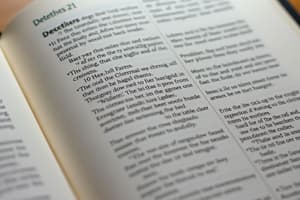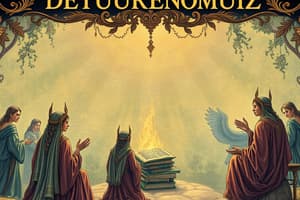Podcast
Questions and Answers
Israel was about to cross the _________ river (Deut. 9:1)
Israel was about to cross the _________ river (Deut. 9:1)
- Jordan (correct)
- Jabbok
- Litani
- Kishon
Moses said the Israelites were going to dispossess nations greater and _______ than they were (Deut. 9:1)
Moses said the Israelites were going to dispossess nations greater and _______ than they were (Deut. 9:1)
- Larger
- Stronger (correct)
- More righteous
- Wiser
The people of the land they were going to take were tall and strong especially the ________ (Deut. 9:2)
The people of the land they were going to take were tall and strong especially the ________ (Deut. 9:2)
- Hivvites
- Moabites
- Amalekites
- Anakites (correct)
God was going ahead of them as they entered the land as a _______ (Deut. 9:3)
God was going ahead of them as they entered the land as a _______ (Deut. 9:3)
After God had driven out the inhabitants of the land, the Israelites were not to say 'The LORD brought me here because _______ (Deut. 9:4)
After God had driven out the inhabitants of the land, the Israelites were not to say 'The LORD brought me here because _______ (Deut. 9:4)
What was the reason the LORD was driving out the nations before Israel (Deut. 9:5)?
What was the reason the LORD was driving out the nations before Israel (Deut. 9:5)?
God was driving out the nations before Israel to accomplish (Deut. 9:5)
God was driving out the nations before Israel to accomplish (Deut. 9:5)
Moses accused Israel of being a ________ people from the day they left Egypt until they arrived on the plains of Moab (Deut. 9:7)
Moses accused Israel of being a ________ people from the day they left Egypt until they arrived on the plains of Moab (Deut. 9:7)
How long was Moses on mount Horeb when he received the ten commandments (Deut. 9:9)?
How long was Moses on mount Horeb when he received the ten commandments (Deut. 9:9)?
The two stone tablets were inscribed (Deut. 9:10)
The two stone tablets were inscribed (Deut. 9:10)
From where did God proclaim the commands after recording them on the tablets (Deut. 9:10)
From where did God proclaim the commands after recording them on the tablets (Deut. 9:10)
When the Israelites built the calf god at Horeb, God said he wanted to do all of the following EXCEPT (Deut. 9:13)
When the Israelites built the calf god at Horeb, God said he wanted to do all of the following EXCEPT (Deut. 9:13)
What did Moses do after seeing the calf god the people had made at Horeb (Deut. 9:17)?
What did Moses do after seeing the calf god the people had made at Horeb (Deut. 9:17)?
Israel's evil at Horeb had provoked God __________ (Deut. 9:18)
Israel's evil at Horeb had provoked God __________ (Deut. 9:18)
Why did the LORD not destroy the Israelites at Horeb (Deut. 9:19)?
Why did the LORD not destroy the Israelites at Horeb (Deut. 9:19)?
Moses did all of the following to the calf god EXCEPT (Deut. 9:21)
Moses did all of the following to the calf god EXCEPT (Deut. 9:21)
At Horeb who did Moses pray for by name (Deut. 9:20)?
At Horeb who did Moses pray for by name (Deut. 9:20)?
What did the LORD tell Israel to do at Kadesh Barnea (Deut. 9:23)?
What did the LORD tell Israel to do at Kadesh Barnea (Deut. 9:23)?
Moses prayed after the Kadesh Barnea incident that God overlook all of the following EXCEPT (Deut. 9:27)?
Moses prayed after the Kadesh Barnea incident that God overlook all of the following EXCEPT (Deut. 9:27)?
Moses argued that if God destroyed them in the desert the Egyptians would say (Deut. 9:28)
Moses argued that if God destroyed them in the desert the Egyptians would say (Deut. 9:28)
Flashcards are hidden until you start studying
Study Notes
Crossing the Jordan River
- Israel was preparing to cross the Jordan River, a significant geographical milestone (Deut. 9:1).
- The nations occupying the land are described as stronger than the Israelites, indicating their formidable presence.
The Inhabitants and Divine Guidance
- The inhabitants were noted for their height and strength, particularly the Anakites (Deut. 9:2).
- God was depicted as going ahead of Israel in a pillar of fire, symbolizing divine guidance and protection (Deut. 9:3).
God's Justification for Dispossession
- The Israelites were reminded not to claim their success as a result of their own righteousness, but rather due to God's covenant with their ancestors (Deut. 9:4-5).
- The wickedness of the nations living in Canaan was the primary reason for their dispossession; God's intention was to fulfill promises made to the forefathers (Deut. 9:5).
Israel's Historical Rebellion
- Moses characterized the Israelites as a rebellious people from their exodus out of Egypt to their arrival on the plains of Moab (Deut. 9:7).
- Moses spent forty days and nights on Mount Horeb receiving the Ten Commandments, demonstrating the gravity of the covenant made with Israel (Deut. 9:9).
The Tablets of the Law
- The Ten Commandments were inscribed on stone tablets by the finger of God, signifying divine authorship (Deut. 9:10).
- After the commandments were recorded, they were proclaimed out of the fire, emphasizing the miraculous nature of the event (Deut. 9:10).
The Incident with the Golden Calf
- Upon witnessing the idolatry of the Israelites with the golden calf, God expressed a desire to destroy them due to their sinfulness (Deut. 9:13).
- In an act of righteous indignation, Moses shattered the tablets upon seeing the people’s idolatry (Deut. 9:17).
Divine Anger and Mercy
- God's anger was provoked by the Israelites' actions at Horeb, yet he refrained from destroying them, showing mercy after Moses interceded (Deut. 9:18-19).
- Moses prayed earnestly for Aaron during this time, indicating supportive leadership within the community (Deut. 9:20).
The Call to Conquer
- At Kadesh Barnea, God commanded the Israelites to take possession of the land, emphasizing the importance of faith and action (Deut. 9:23).
- The prayer of Moses after their rebellion at Kadesh Barnea illustrates his role as mediator before God, highlighting themes of repentance and intercession (Deut. 9:27).
Implications of Judgment
- Moses articulated concerns that if God destroyed the Israelites in the desert, the surrounding nations would misinterpret God's actions as hatred rather than fulfillment of covenant promises (Deut. 9:28).
Studying That Suits You
Use AI to generate personalized quizzes and flashcards to suit your learning preferences.




